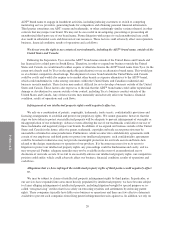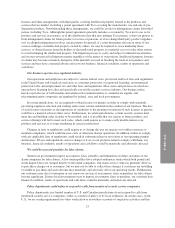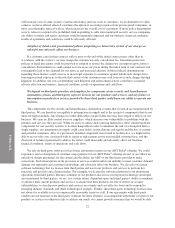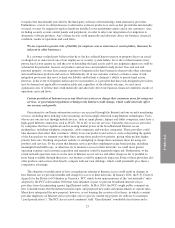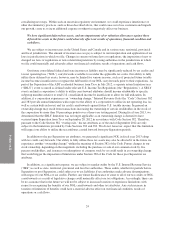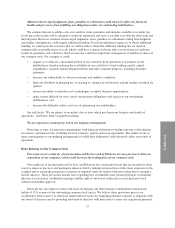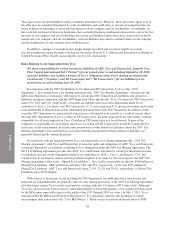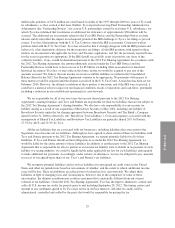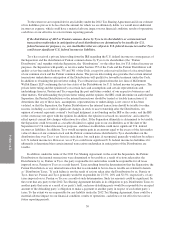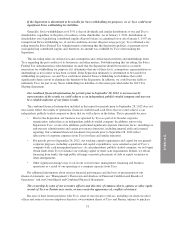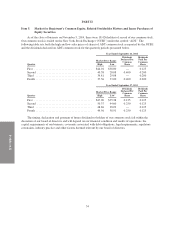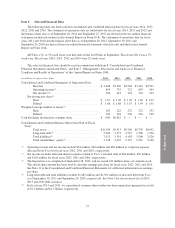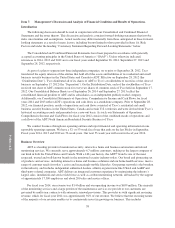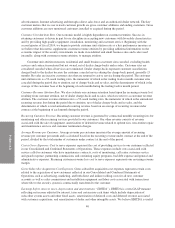ADT 2014 Annual Report Download - page 96
Download and view the complete annual report
Please find page 96 of the 2014 ADT annual report below. You can navigate through the pages in the report by either clicking on the pages listed below, or by using the keyword search tool below to find specific information within the annual report.
FORM 10-K
To the extent we are responsible for any liability under the 2012 Tax Sharing Agreement and if our estimate
of tax liabilities proves to be less than the amount for which we are ultimately liable, we would incur additional
income tax expense, which could have a material adverse impact on our financial condition, results of operations,
cash flows or our effective tax rate in future reporting periods.
If the distribution of ADT or Pentair common shares by Tyco to its shareholders or certain internal
transactions undertaken in anticipation of such distributions are determined to be taxable for U.S.
federal income tax purposes, we, our stockholders that are subject to U.S. federal income tax and/or Tyco
could incur significant U.S. federal income tax liabilities.
Tyco has received a private letter ruling from the IRS regarding the U.S. federal income tax consequences of
the Separation and the distribution of Pentair common shares by Tyco to its shareholders (the “Pentair
Distribution” and, together with the Separation, the “Distributions”) to the effect that, for U.S. federal income tax
purposes, the Separation will qualify as tax-free under Section 355 of the Code and the Pentair Distribution will
qualify as tax-free under Sections 355 and 361 of the Code, except for cash received in lieu of a fractional share
of our common stock and the Pentair common shares. The private letter ruling also provides that certain internal
transactions undertaken in anticipation of the Distributions will qualify for favorable treatment under the Code.
In addition to obtaining the private letter ruling, Tyco obtained an opinion from the law firm of McDermott
Will & Emery LLP confirming the tax-free status of the Distributions for U.S. federal income tax purposes. The
private letter ruling and the opinion rely on certain facts and assumptions and certain representations and
undertakings from us, Pentair and Tyco regarding the past and future conduct of our respective businesses and
other matters. Notwithstanding the private letter ruling and the opinion, the IRS could determine on audit that the
Separation, the Pentair Distribution or the internal transactions should be treated as taxable transactions if it
determines that any of these facts, assumptions, representations or undertakings is not correct or has been
violated, or that the Separation, the Pentair Distribution or the internal transactions should be taxable for other
reasons, including as a result of significant changes in stock or asset ownership after the Distributions. An
opinion of counsel represents counsel’s best legal judgment, is not binding on the IRS or the courts, and the IRS
or the courts may not agree with the opinion. In addition, the opinion was based on current law, and cannot be
relied upon if current law changes with retroactive effect. If the Separation ultimately is determined to be taxable,
the Separation could be treated as a taxable dividend or capital gain to our stockholders as of the date of the
Separation for U.S. federal income tax purposes, and those stockholders could incur significant U.S. federal
income tax liabilities. In addition, Tyco would recognize gain in an amount equal to the excess of the fair market
value of shares of our common stock and the Pentair common shares distributed to Tyco shareholders on the
distribution date over Tyco’s tax basis in such shares, but such gain, if recognized, generally would not be subject
to U.S. federal income tax. However, we or Tyco could incur significant U.S. federal income tax liabilities if it
ultimately is determined that certain internal transactions undertaken in anticipation of the Distributions are
taxable.
In addition, under the terms of the 2012 Tax Sharing Agreement, in the event the Separation, the Pentair
Distribution or the internal transactions were determined to be taxable as a result of actions taken after the
Distributions by us, Pentair or Tyco, the party responsible for such failure would be responsible for all taxes
imposed on us, Pentair or Tyco as a result thereof. Taxes resulting from the determination that the Separation, the
Pentair Distribution, or any internal transaction that was intended to be tax-free is taxable are referred to herein
as “Distribution Taxes.” If such failure is not the result of actions taken after the Distributions by us, Pentair or
Tyco, then we, Pentair and Tyco generally would be responsible for 27.5%, 20% and 52.5%, respectively, of any
taxes imposed on us, Pentair or Tyco as a result of such determination. Such tax amounts could be significant. In
the event that any party to the 2012 Tax Sharing Agreement defaults in its obligation to pay Distribution Taxes to
another party that arise as a result of no party’s fault, each non-defaulting party would be responsible for an equal
amount of the defaulting party’s obligation to make a payment to another party in respect of such other party’s
taxes. To the extent we are responsible for any liability under the 2012 Tax Sharing Agreement, there could be a
material adverse impact on our financial condition, results of operations, cash flows or our effective tax rate in
future reporting periods.
30


